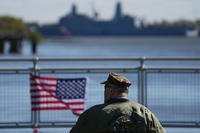Military mail service has continued for retirees living overseas while the Pentagon conducts a legal analysis and policy review of the benefit for all non-active duty patrons of the Military Postal Service.
Military retirees and family members began receiving word in June that their mail privileges would be revoked on Aug. 24, the result of a Defense Department review of the Military Postal Service Manual that determined that some patrons weren't eligible for the benefit.
But the decision, which was never made public officially, generated an outcry from retirees, and their advocates, who stood to lose access to mail service they rely on for medications via Tricare's mail order pharmacy, voting ballots, and Department of Veterans Affairs claims filings and checks.
The determination to cut off access to some groups was rescinded July 9 "until further notice" while the DoD reviews its agreements with countries where the Military Postal Service operates and reexamines U.S. law, according to an email to members of Congress from the DoD obtained by Military.com.
"There will be no disruption in services while the Department conducts a thorough legal analysis to ensure policies do not violate fiscal laws," according to the email, the contents of which were shared by a congressional staff member.
Mike Applegate, a retired Navy command master chief who lives in the Philippines, said the issue is so important to him that he visited the offices of Sen. Chuck Schumer, D-N.Y., and Bernie Sanders, I-Vt., while on vacation to press for answers.
He said retirees would lose access to benefits they have earned, such as low-cost medications, and may be subject to voter suppression, as ballots could easily get lost in international mail.
"If this is a fiscal issue, then hopefully it might come down to providing funding," Applegate said in an email July 27.
An estimated 40,000 military retirees reside overseas, according to the department, while an unknown number of family members, survivors, nonprofit groups and businesses also have access to the system, which lets patrons send and receive mail weighing up to 16 ounces at domestic rates.
The proposed change would not have affected all these beneficiaries, however. In their email to Congress, DoD officials confirmed that the change was pending for some, while others would continue to receive the service.
"It is important to note that each Host Nation Agreement can vary from country to country," officials wrote. "The Department [has] requested the geographic combatant commands review the HNAs in their areas of responsibilities to determine if there are any additional patron restrictions."
In the email, the DoD said the legal analysis of patrons would be completed by the first week of August, while the combatant command review would take 60 days to complete. An announcement is expected this fall.
The Military Postal Service Agency was created in 1980 to consolidate the mail systems of the individual military services. It provides mail in 63 countries to active-duty personnel and their family members, DoD civilian employees and their families, and U.S. military contractors.
Other groups authorized to use it, depending on agreements with host countries, include retirees, nongovernmental organizations like the American Red Cross and USO, banks that serve U.S. service members, and American crews of Military Sealift Command.
The Pentagon review of the system and policy update in May scaled down the eligible patrons to "individuals authorized to use MPSA postal services and mail program within and outside the United States, consistent with international agreements; laws; and Federal, USPS, GSA, and DoD regulations."
DoD officials told Military.com in June that the policy was updated "after a legal review determined that some MPS patron categories included over time are either not authorized by law or not permitted by host nation agreement."
Pentagon officials also said at least seven of the 21 formerly authorized patron groups lacked "established fiscal authority" to have access to the system, which allows most patrons to send and receive mail at domestic rates through FPO and APO mailboxes.
Now, these groups must wait another few months before learning whether they will lose access to the benefit. But Applegate encouraged them to get involved while the review is ongoing.
"The fight isn't over, and veterans would be wise to continue to contact their legislators if they haven't already," Applegate said.
-- Patricia Kime can be reached at Patricia.Kime@Monster.com. Follow her on Twitter @patriciakime.
Related: Coalition Launches Effort to Get Veterans to the Polls -- As Workers














